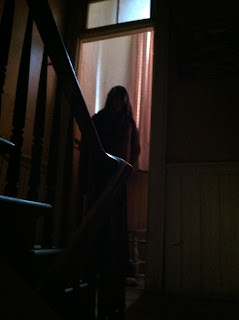Nano's almost over! Let the fun begin!
You've done it. You've written a book. Your manuscript is complete; your story arc has touched down. The first draft puking has stopped. Next up, my favorite phase...the glorious days/months/years of revision!
I adore revising. I have, in fact, been revising my books for years. And years. And...years, which makes me something of an expert on revision. And the first thing I can tell is...don't start yet. As much as you want to scrub the guck off those fifty-thousand words and let your critique group see them shine, don't. Put it away, for a few weeks at least, until you've forgotten everything you did or were trying to do. Going in cold is one of the best things you can do for a new manuscript. It's easier to see what's working and what's not because you've forgotten about all those darlings you've built in. You know...those super clever things that totally aren't working and detract from your story? Yeah, those.
So give yourself a month away from the infant manuscript. Read some books. Revise something else. Brainstorm new book ideas. Whatever. When you finally get back to it, you'll be a much more objective critic.
Let's skip ahead a few months/years/decades... You've reread and revised. You've responded to comments from your critique group. You're ready to send it out but shouldn't you go through it
one more time, just to make sure?
Obviously, we want our submittals to be the best they can be, but sometimes we writers just don't know when to let go. We put off sending out a manscript because we're being cautious or, possibly, as a subconcious effort to avoid rejection. [I could totally name some Monkeys who are super guilty of this, but I won't because I'm classy like that.]
So, when *is* a manuscript ready? Here are five points to consider...
1) You've changed something back to an earlier version. If you drafted a revision, then decided two weeks later that it worked better in the original, chances are it's time to stop revising. You could go back and forth forever. Better to send it out and see what a professional makes of it than spin your wheels endlessly.
2) The revisions you're working on make the book 'different' but not necessarily 'better'. There are hundreds of little changes that would make our books 'different'. But if you're making a lot of revisions that don't
improve the manuscript, it's probably time to stop revising. If an editor or agent loves your book, they're certainly not going to reject it because your main character's name is Bob instead of Bill.
3) Your critique group opens your submittal and groans, "Ugh. Not this again." I usually submit something to the Monkeys once. If they suggest huge revisions to it, I might send it back for feedback on the changes, but that's rare. I never, ever send anything three times. My feeling is, once they sign off on it, it's pretty darn close to editor-ready.
4) Your heart isn't in it. Remember the first-draft days when you jotted down fab lines of dialogue and snazzy plot twists at stop lights? If you don't feel at least a smidgeon of the same love for your manuscript, it's time to move on to something new. Writers write because it's our passion. If the passion between you and your manuscript is gone, it's because you've turned it into a job instead of a love. Send it out and let someone else fall in love with it.
5) You can't figure out what else to do with it. This seems obvious. If you can't find anything else to fix, it must be ready. Right? Yet so many times, we writers fail to see this. We stare at the words; we make small changes (a la #2); but we just can't believe it's ready. Perhaps we're waiting for a sign from the Almighty.
Send out your book now written in the clouds. (FYI, this hardly
ever happens.) If you can't figure out what else to do to it, the next step is probably to send it out. The first round of comments you get back will help you determine if there really is something you need to address, or if it just needs to find the right home. Either way, you're making forward progress.
Remember...one-hundred percent of shots not taken, don't score. Your book will never be published if it remains hidden on your hard drive. So take a chance. When it's ready--send it out!

















